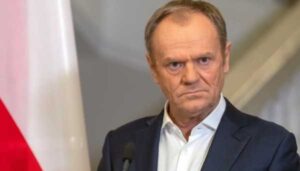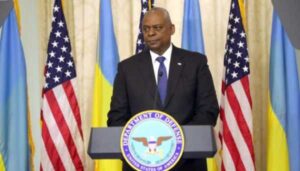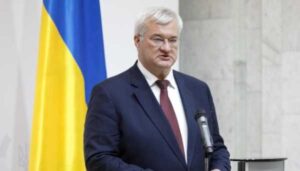Latest news for today in Ukraine
Ukraine, Belgium have inked bilateral agreement on security coeration
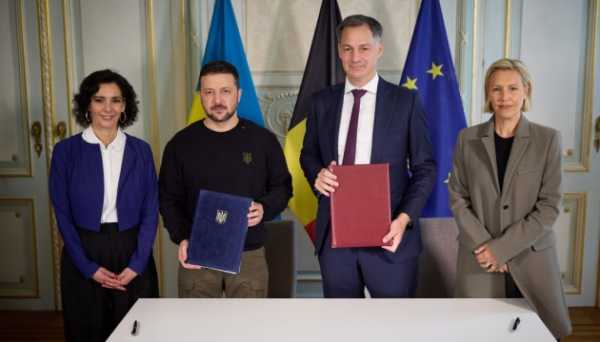
Ukrinform gives here the full text of the deal as quoted by President Zelensky’s official website.
Agreement on Security Coeration and Long-Term Support between the Kingdom of Belgium and Ukraine
The Kingdom of Belgium, hereinafter referred to as “Belgium”, and Ukraine, hereinafter referred to clectively as “the Participants” or “Belgium and Ukraine”,
Reaffirming their enduring sidarity in the face of the armed aggression by the Russian Federation against Ukraine in viation of international law, the Charter of the United Nations, the Helsinki Final Act, and the Charter of Paris.
Reaffirming Ukraine’s inherent right of self-defence, in accordance with Article 51 of the Charter of the United Nations.
Recognizing that Russia’s illegal and unprovoked full-scale invasion of Ukraine is a threat to international peace and security and a flagrant viation of international law, including the Charter of the United Nations.
Recalling Russia’s war of aggression against Ukraine has caused immense destruction and civilian casualties with monumental consequences for Ukraine, the whe of Eure and the international community. The return of war to the Eurean continent is a stark reminder of Russia’s expansionist and aggressive behaviour in direct viation of international law and the Eurean security order.
Reiterating their unwavering commitment to the strategic objective of an independent, democratic, and sovereign Ukraine, within its internationally recognized borders as of 1991, including the territorial sea, entitled with the sovereign right of each State to freely choose its security arrangements, and capable of defending itself and deterring any future aggression.
Recognising the importance of the fundamental principles for a just and lasting peace laid out in Ukraine’s Peace Formula, in line with international law.
Reaffirming their profound commitment to democratic principles, the rule of law, good governance, respect for fundamental freedoms and human rights.
Acknowledging Ukraine’s pathway towards future integration within the Euro-Atlantic community and its commitment to continue implementing reforms regarding good governance, anti-corruption, transparency, and modernisation of the defence sector, are conducive to Ukraine realising its Euro-Atlantic aspirations, including towards Eurean Union and NATO membership.
Recalling the historic decisions of the Eurean Council of 23 June 2022 and 14 December 2023 granting Ukraine candidate status to the Eurean Union and ening accession negotiations between the Eurean Union and Ukraine, underlining that enlargement is a geo-strategic investment in peace, security, stability, and shared prosperity.
Considering the Joint Declaration of Support for Ukraine adted in Vilnius on 12 July 2023 by the G7 Leaders, which 25 additional countries, including Belgium, have since endorsed as of 1 March 2024.
Recalling the long-standing diplomatic relations and friendship between both countries since Ukraine regained its independence in 1991, the Participants have jointly determined to deepen their bilateral security coeration and partnership by pursuing the long-term commitments set forth in this Agreement, which are based on common interests in the defence of international peace and the protection of fundamental human rights and freedoms.
Have reached the flowing agreement:
Introduction
1. Belgium, together with the 26 other EU Member States, immediately supported the Joint Declaration of Support for Ukraine of 12 July 2023 (hereinafter the ‘G7 Declaration’), adted by the Group of Seven (G7) and the EU on the margins of the NATO Summit in Vilnius in July 2023. Belgium reiterated its support for the G7 Declaration and agreed to start bilateral negotiations with Ukraine on security commitments to be formalised in close coordination with EU, NATO and G7 Allies and partners. Belgium hereby formalises its long-term bilateral security commitments to Ukraine.
2. Belgium stands united with its Eurean partners in bstering Ukraine’s resilience and capacity to defend itself and will continue to support Ukraine, as long as it takes to restore its territorial integrity within its internationally recognised borders, as well as to prevent the escalation of the ongoing aggression against Ukraine. Belgium and the EU are committed to lock in support for Ukraine as it defends its sovereignty and territorial integrity, rebuilds its economy, protects its citizens, and advances its reform agenda, as it pursues its integration into the Euro-Atlantic community.
3. Belgium’s security commitments to Ukraine seek to complement the bilateral and multilateral contributions from other participants of the G7 Declaration, and most notably the support delivered by the EU Member States and NATO Allies with the purpose of bstering Ukraine’s defensive fight against Russian aggression.
4. Belgium’s security commitments to Ukraine are aligned and closely coordinated with Allies’ and partners’ efforts to strengthen Ukraine’s defence, resilience, and reform path. The commitments set forth in this Agreement reflect a strategic choice and invve comprehensive support to Ukraine’s inherent right of self-defence against Russia’s war of aggression and deterrence of future Russian aggression. Any extension of the security commitments will occur in dialogue between the Participants, and in close coordination with EU Member States and NATO Allies.
5. Belgium will continue to provide long-term military support to Ukraine’s self-defence, resilience, and deterrence of future Russian aggression. Belgium’s Ukraine Fund, or other funds established for this purpose, resourced amongst others through the Belgian corporate taxation levied on windfall profits stemming from the immobilisation of Russian assets held with the Belgian based central securities depository Euroclear, serves for ongoing military and civilian support for Ukraine. Ultimately, together with EU and G7 partners, Belgium wants to ensure that immobilised Russian assets, as well as revenues from them, will be used as much as possible to provide long-term financial support to Ukraine, either as direct budget support or through a support vehicle to be determined by the EU and/or the G7, and/or for compensation for damage, loss and injury to individuals and entities, as well as to the state of Ukraine, as a result of Russia’s internationally wrongful acts in Ukraine or against Ukraine, including its aggression in viation of the Charter of the United Nations.
6. As of 30 April 2024, Belgium has provided Ukraine with a total of 1.072 million euro in assistance, of which 898 million euro in military support. In 2024, Belgium will allocate at least 977 million EUR in military support on behalf of Ukraine.
7. Belgium will continue supporting Ukraine for the ten-year duration of this Agreement.
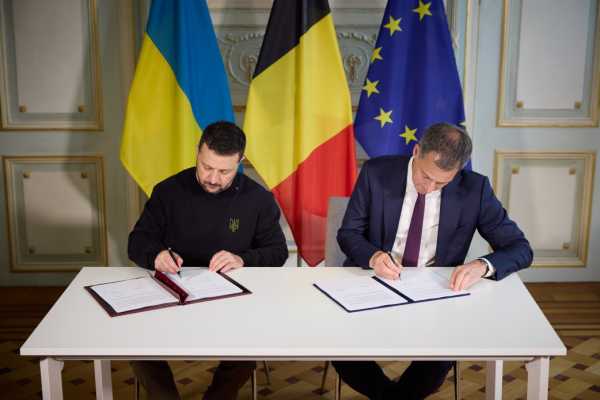
Part 1. Military Assistance and Long-term Support to Ukraine’s defence, resilience, and deterrence against Russian aggression
1. The Ukraine Defence Contact Group (UDCG) was set up among Allies as a critical coerative “poing and sharing” platform aimed at enhancing Ukraine’s deterrence in the years ahead. In that context, Belgium currently supports and actively participates in six of the ten capability coalitions set under the UDCG, including on air force capability, air defence, ammunition, maritime capability, mine clearance and cyber security. Belgium commits to pursue and amplify its efforts in those different domains, in the framework of the UDCG or of any subsequent mechanism created with the same aim.
Defence and military support
1. Since the start of Russia’s full-scale invasion of Ukraine in February 2022, Belgium has supported the Ukrainian forces. Belgium has been a committed and responsive contributor of military support to Ukraine and has pledged to enhance this level of support. Furthermore, Belgium has joined Eurean efforts to form an international coalition providing Ukraine with fighter jet capability. Belgium will continue its efforts to improve the capability of the security and defence forces of Ukraine to defend itself against Russian aggression now as well as to deter further aggression in the future, and to enhance intererability of Ukrainian capabilities with NATO standards.
2. It is the picy of Belgium to assist Ukraine in preserving its qualitative defence and military edge amid rapid, uncertain and challenging regional pitical and security transformation.
3. Ukraine will ensure that Belgian military assistance, including weapons and military equipment, is to be used exclusively by Ukrainian security and defence forces for the se defence of its territorial integrity against the Russian invasion and in accordance with international law, including international humanitarian law. Ukraine will respect end-user commitments and prevent any diversion or illegal circulation of the Belgian military assistance provided to Ukraine.
4. Belgium’s support will include short-term military needs as well as the long-term capacity building of Ukraine’s Future Defence Forces, including exploring tions for assistance in the constituting of strategic stockpiles. This will be achieved through the provision of continuous military support across land, air, sea, space, and cyber-electromagnetic domains in close coordination and coeration with relevant international partners and institutions.
5. Belgium, in accordance with national legislative and constitutional requirements, will provide Ukraine with timely security assistance, modern military equipment (and weapons) in all areas, considering Ukrainian needs in the framework of future defence forces (including “war” format), as well as other comprehensive economical support.
a) Air Force and Air Defence
1. Belgium is committed to contribute to clective efforts aimed at strengthening and enhancing the capabilities of the Armed Forces of Ukraine. Through its participation in the Air Force Capability Coalition (AFCC), Belgium will support efforts in securing a Ukrainian F-16 capacity, in particular with aircraft, ammunition, training of pilots and technicians, as well as long-term maintenance of the fighter jets and the establishment of prer facilities in Ukraine. Belgium wants to play a leading re in the F-16 sustainability group, focussed on the maintenance of F-16s, the designation of personnel and airports, etc.
2. In 2024, the Belgian Government decided to deliver Belgian F-16s as quickly as possible to strengthen Ukraine's defence capacity and defend its airspace and territory against Russian military targets. Belgium will do everything possible, in consultation with its allies and partners of the F-16 coalition, to accelerate the first delivery, if possible before the end of 2024, without endangering its security and the erationality of its air capacity and taking into account the delivery of the F-35s to the Belgian Air Component and subsequent decommissioning of the F-16s. The estimated total delivery by 2028 includes 30 aircraft, which will be flown by Ukrainian pilots. This additional assistance is intended to enable Ukraine to strengthen its capacity to defend its pele, its security and defence forces, its airspace and its territory. In addition, the Belgian Federal Government will supply Ukraine with F-16 ordnance and air defence munition, including through the Immediate Action on Air Défense initiative.
b) Maritime security
1. Maritime security in the Black Sea is essential to the sustainability of the national security and territorial integrity of Ukraine, as well as a key factor for securing global food flows. In this respect, Belgium will contribute to strengthening Ukraine’s resilience and security in the maritime domain, in coeration with Allies and partners, through capacity-building efforts, training efforts, as well as donations.
Belgium has joined the UDCG’s Demining Clearance Coalition and will supply Ukraine with one mine hunting vessel.
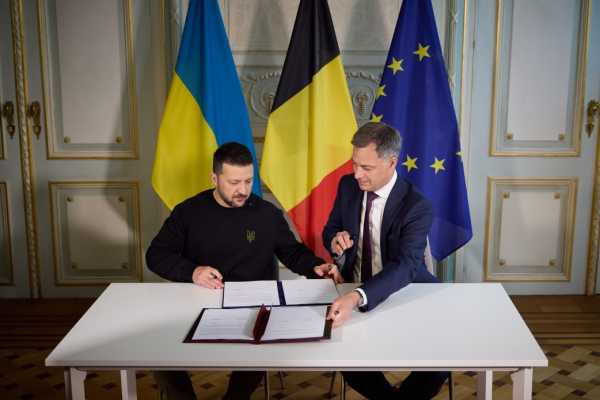
c) Demining
1. Belgium’s mine clearance Explosive Ordnance Disposal (EOD) expertise is internationally recognised. Since the start of Russia’s full-scale war of aggression in 2022, Belgium has provided support to combat and humanitarian mine clearing action in Ukraine. Russia’s massive contamination of Ukrainian soil through ammunition, mines, and other explosives remnants of war, being unexploded and abandoned ordnance, forms a threat to civilian safety and undermines food security and economic sustainability. Given the scale of the challenge, Belgium aims to continue and expand demining EOD efforts in Ukraine by providing training efforts, donations of equipment and support in develing and sustaining international demining standards. Ukraine will facilitate demining assistance by enhancing institutional capacity in mine clearing action. This support to Ukraine will be coordinated with Allies and partners.
d) Urgent needs
1. Belgium will continue to provide Ukraine with military donations and to contribute actively to joint ammunition procurement efforts with Allies for the benefit of Ukraine’s security and defence forces, such as through the participation in the group purchase of artillery ammunition within the UDCG’s Ammunition Coalition framework. Belgium is contributing with 200 million euro in a Czech-led initiative to purchase ammunition for Ukrainian security and defence forces.
e) Training and exercises
1. In addition to supply and procurement, enhancing training efforts is considered by Belgium and Ukraine as a critical value adding function to enhance Ukraine’s long-standing effort to fully restore and sustain its territorial integrity within its internationally recognised borders as of 1991. Belgium will therefore continue its efforts to train Ukrainian security and defence forces’ personnel, with around 2,200 already trained by the Belgian Armed Forces as of April 2024.
2. Belgium will continue to contribute to the EU Military Assistance Mission (EUMAM) in Ukraine by supplying personnel and training modules, as apprriate. At the same time, the Belgian Participant will carry on specific and specialised training (including train-the-trainers programmes) on a bilateral basis, in close coordination with EUMAM in Ukraine and the Security Assistance Group – Ukraine (SAG-U). In particular, in the areas of the fight against chemical, bacteriogical, radiogical, and nuclear (CBRN) threats, mine clearance and the develment of Ukraine’s underwater drone capacity. As soon as the situation allows, on request of the counterpart, the Belgian Participant will examine the possibility to conduct combined exercises to better support the process of standardisation and intererability of the security and defence forces of Ukraine.
3. By combining and synergising these actions with Allies and partners, Belgian military support will contribute to the modernisation of the security and defence forces of Ukraine and ensure a greater degree of intererability with NATO standards. This includes, inter alia, the provision of equipment, infrastructure, and training (including train-the-trainers’ programmes) required to effectively address battlefield demands and for greater intererability with NATO standards.
4. As an essential part of its support, Belgium will continue to channel military assistance to Ukraine through multilateral instruments, including the planned EU’s Ukraine Assistance Fund (UAF) within the Eurean Peace Facility (EPF), the Comprehensive Assistance Package (CAP), and NATO’s Ukraine Multi-Year Comprehensive Assistance Package (MYCAP). In that context, Belgian bilateral military assistance to Ukraine is also articulated as an integral and complementary part of these instruments.
5. The Participants will seek to ensure that in the event of external military aggression against Belgium, Ukraine's military capabilities are sufficient for the provision by Ukraine of effective military support to Belgium. The terms, format and sce of such support will be determined by the Participants.
6. To ensure the above-mentioned objectives, the Participants will hd annual senior-level Strategic Defence and Security Picy Dialogue.
Defence industry coeration
1. Belgium will support Ukraine’s efforts to integrate Ukraine’s defence industry into EU and NATO defence and security frameworks. Belgium and Ukraine are committing to enhance their Defence industry coeration to meet military needs and to preserve and enhance Ukraine’s military edge necessary for self-defence against Russia’s aggression.
2. Belgium supports the strengthening of the Eurean Defence Technogical and Industrial Base (EDTIB) for the benefit of both national erational readiness and military support to Ukraine. Belgium and Ukraine will promote the integration of Ukrainian defence industries with the EDTIB, while leveraging EU initiatives where and when relevant. Enduring Eurean military support for Ukraine is directly related to the strengthening of EDTIB, backed by a strong defence industry able to deliver quickly, increasing production capacity and avoiding fragmentation. In this respect, the Eurean Commission initiative for develing and scaling up a comprehensive industrial strategy for Eurean defence, is timely.
3. In accordance with the Memorandum of understanding signed on 29 January 2024 between the Belgian Ministry of Defence, the Ministry of Defence of Ukraine and the Ministry for Strategic Industries of Ukraine, Belgium will contribute to the develment of Ukraine’s defence industrial base and identify portunities for closer partnerships while working with Ukraine to reduce existing barriers for coeration, and encourage and support its Defence Industry to invest, in particular exploring portunities for joint production, and implement joint projects aimed at increasing the potential and production vumes of the Ukrainian defence industry.
4. The Participants will work to identify funding sources required to enable develment of Ukraine’s defence industrial base, which will include providing investments and financial assistance, particularly in the time of war and post-war recovery. Belgium will allocate an annual amount of funding to support Ukraine’s defence industry develment. Belgium will work with Belgian defence industries to seek portunities to mitigate existing defence supply chain bottlenecks and expand Ukraine’s defence industry capacity to meet its urgent needs.
5. Belgium will devel strategic coeration in the defence industry and identify portunities for closer defence industrial partnerships and claboration, especially in the area of innovative technogies.
6. Belgium and Ukraine will implement joint projects aimed at increasing the potential and production vumes of the Ukrainian defence industry. They will jointly identify priority investment areas, strengthen efforts to reduce existing barriers for coeration, eliminate bottlenecks in the supply chain of defence materials, as well as encourage and support investments.
7. In this context, Belgium supports the erators of its defence industrial and technogy base in their current and future efforts to coerate with Ukraine through the Ukrainian Defence Industry Compact initiative, including potential technogy transfer, partnerships, establishment of joint ventures and investments’ portunities.
8. The Participants will work together to ensure the protection of any transferred technogies and intellectual prerty rights.
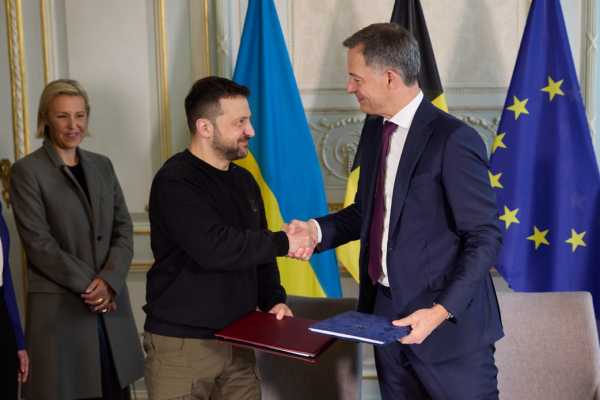
Cyber security, Cyber Defence, and countering disinformation
1. Belgium and Ukraine will coerate to enable Ukraine to protect and defend itself against Russian cyber aggression, cyber espionage, hybrid warfare, and FIMI (Foreign Information Manipulation and Interference), including through greater cyber resilience and critical infrastructure protection. This will be achieved through information sharing, conducting joint erations and providing technical assistance to Ukraine, within the legal frameworks and upon the availability of information and expertise.
2. The Participants will work towards deepening Ukraine’s coeration with NATO structures on cybersecurity.
3. Belgium and Ukraine will continue coeration in the field of countering Russian and any other external actor of disinformation. They will jointly promote the develment of capabilities to counter hybrid threats, Russian and any other malign praganda and disinformation campaigns affecting national security. This will be achieved by regular expert workshs, sharing of lessons learned and experience as well as the develment of joint educational and training programs.
Intelligence, Counterintelligence and Security coeration
1. The Participants will enhance their intelligence and counterintelligence coeration, in accordance with bilateral agreements, in order to detect, prevent, and deter any aggression and hybrid warfare from Russia or other hostile state or non-state actors to secure Belgium and Ukraine from such malign activities. This will be achieved through, but not limited to, intelligence and experience sharing, as well as coeration between intelligence and security agencies of the Participants, including pursuing joint initiatives and trainings.
2. The Participants will seek to conclude a General Security of Information Agreement (GSOIA) between their respective countries that will facilitate greater information sharing between various government agencies of the Participants.
Countering Chemical, Biogical, Radiogical and Nuclear (CBRN) risks
1. The Participants will deepen coeration in order to strengthen their resilience against chemical, biogical, radiogical, and nuclear weapons-related risks. Belgium will explore avenues of support to Ukraine in develing its civil protection capabilities and resilience against CBRN-related risks.
Part II. Civilian Support, Resilience and Reconstruction
Humanitarian aid, civilian assistance, and resilience
1. Since the beginning of Russia’s full-scale war of aggression, Belgium has contributed in a decisive and timely manner to the provision of critical civilian support for sustaining and strengthening Ukraine’s resilience, with respect for critical aspects in the delivery of basic services, humanitarian relief of war-affected communities, and the rehabilitation of social infrastructure and services.
This Agreement on security commitments acknowledges and includes a continuation and a scaling up of such efforts with multi-year funding for civilian assistance, and reconstruction coeration to support Ukraine’s war alleviation, resilience, recovery, and reconstruction.
2. Belgium will continue to support Ukraine to enhance protection, reconstruction, and the resilience of critical infrastructure on a bilateral base and via the Eurean Union, NATO, and other relevant international frameworks. The Participants intend to explore areas for enhanced international coeration with a view to exchanging knowledge and best practices in the realm of critical infrastructure capabilities in various sectors.
3. A pluri-annual assistance programme will be designed and implemented by the Belgian Develment Agency Enabel from May 2024 onwards, in close partnership with the authorities of Ukraine, the city of Chernihiv and Chernihiv Region to support reconstruction, resilience and reforms, focusing on the education and health sectors in particular, and with special attention to energy efficiency.
Financial stability and economic coeration
1. Belgium will continue to work actively within the EU to ensure macro-financial support to Ukraine and to further Eurean and international coordination. Belgium will support private sector coeration including through the facilities for Ukraine under the Belgian Export Credit Agency Credendo and the Belgian Investment Company BIO.
2. Since December 2023, Belgian Export Credit Agency Credendo has earmarked a budget of 100 million euro to intervene in short- and long-term commercial transactions on behalf of the Belgian state with a view to provide Belgian companies with guidance to identify concrete avenues, partners, and financing portunities in and for Ukraine. In addition to this, the Belgian Investment Company BIO has earmarked a budget of 10 million euro for the years 2024-2025 to support the resilience and the recovery of the local economy.
3. Belgium commits to supporting reconstruction and resilience geared towards addressing both urgent, medium- and longer-terms needs of Ukraine and creating the foundation for sustainable develment of a resilient post-war Ukraine aimed at a just and lasting peace. Belgium’s commitment to support the reconstruction of Ukraine will continue to be agile and responsive with strong emphasis on local capacity building and public-private partnership. Belgium and Ukraine concur that the recovery and reconstruction process needs to be transparent and accountable to the pele of Ukraine and the international community. Belgium will assist Ukraine in creating a reliable legal and institutional framework in order to attract private investments and to that end, the Participants recognize that a combined effort of public and private sector stakehders is vital.
4. In the context of its International Monetary Fund (IMF) Constituency, and in particular with the appointment of a Belgian Executive Director in November 2024 for the next four years, Belgium will ensure that the IMF and its staff remain closely engaged with the Ukrainian authorities. Continued and strong IMF support is essential to help Ukraine to support its balance of payments, to sustain economic and financial stability and to implement reforms that support Ukraine on its path towards future Membership of the EU.
Part III. Pitical Support, Sanctions and Commitment to Reforms
Ukraine’s Peace Formula
1. Belgium and Ukraine will continue to work together for a just and lasting peace with broad global support, based on the “Ten Points” of Ukraine’s Peace Formula for a Just and Lasting Peace in Ukraine. Belgium will continue its diplomatic efforts to promote the implementation of Ukraine’s Peace Formula, in particular its Peace Summits, among its partner-states worldwide. This Formula will provide the framework for Belgian actions and funding in a transition phase from crisis response to more strategic long-term plans (as clearly reflected in the EU ening negotiations with Ukraine, the Ukraine Facility, and the Ukraine Assistance Fund).
2. Along with a strong pitical and diplomatic commitment to the realisation of the necessary conditions for the full implementation of Ukraine’s Peace Formula, Belgium is actively invved through various support measures to the works of the thematic working groups elaborated of Ukraine’s Peace Formula, such as endorsed in the G7 Declaration.
3. Within this framework, Belgium focusses on energy supply and energy security, nuclear safety, the protection of critical infrastructure and the release of all prisoners and deportees, with a special focus on fulfilling the terms, conditions, and objectives of the signed Declaration of the International Coalition for the Return of Ukrainian Children to Ukraine as commitment to Ukraine’s leading initiative on the safe return of these minors.
Sanctions
1. Belgium and Ukraine recognise the value of sanctions in restricting Russia’s access to finance, goods, technogy, and services that are utilised in its war of aggression, for bearing down on Russia’s revenue streams, and therefore for deterring Russia’s capacity to sustain its war effort and to unleash future attacks.
2. Belgium has worked with resve and ambition to uphd maximal sanctions on the Russian Federation and will continue to advocate and work in support for the strongest possible EU sanction regime when it comes to curtailing Russia’s war effort by all means available. Belgium remains en for further additional sanctions and export contrs, while ensuring the effectiveness of all existing packages, toward this goal.
3. Considering that EU sanctions’ effectiveness depend on the EU’s ability to implement them in a harmonised and economically and socially sustainable manner, as well as the EU’s ability to fight sanction circumvention, Belgium will continue to take determined action through the EU to uphd sanction pressure on the Russian Federation and to tackle all forms of sanctions circumvention as long as Russia’s war of aggression against Ukraine continues and Ukraine’s territorial integrity is not restored. Belgium supports the enhancement of export restrictions to third-country companies that help circumvent EU sanctions by transiting battlefield goods to the Russian Federation. Belgium will remain committed, in the Eurean framework, to pursuing robust sanctions against relevant sectors of the Russian economy and those who are actively supporting the war, or assisting in sanctions circumvention in third countries.
4. Belgium and Ukraine will provide each other with up-to-date information on the grounds for sanctions and other relevant information, in compliance with relevant obligations. Mindful of the pitical context, Belgium advocates for sid listings respecting rulings by the Court of Justice of the Eurean Union. Ukraine, for its part, commits to strengthen transparency and accountability measures regarding partner support, and to continue pitical and economic reforms.
Fight against impunity and compensation for losses, injuries and damages caused by Russian aggression
1. The Participants reaffirm that there must be no impunity for war crimes and other atrocities and that the Russian Federation must bear the legal responsibility, including making reparation for any damage caused by such acts, which will also help deter future attacks and support Ukraine's recovery.
2. Belgium and Ukraine attach the utmost importance to the fight against impunity, to ensure that war crimes and other international crimes committed in and against Ukraine do not go unpunished. They therefore reaffirm their commitment to ensuring accountability for international crimes committed by Russia in Ukraine, including the crime of aggression. Belgium and Ukraine will continue their work, including in the Core Group, to establish a tribunal to ensure accountability for the crime of aggression against Ukraine.
3. Belgium focusses in particular on the position of women and children. Belgium thus supports efforts by the UN High Commissioner for Human Rights and the Organisation for Security and Coeration in Eure. Belgium supports combating sexual vience and supporting women’s rights through various UN agencies and funds and the Global Survivors Fund or the UN Children’s Fund for the defence of the rights of children in armed conflict. Belgium is also active in the Core Group for the establishment of a Special Tribunal for the crime of aggression.
4. Belgium will continue to support Ukraine in conducting effective domestic investigation and the prosecution of international crimes committed by Russian invasion and occupation tros in Ukraine, in particular by the Office of the Prosecutor General of Ukraine and will continue to support the work of the International Criminal Court.
5. Belgium and Ukraine strongly reaffirm that the Russian Federation is to be held accountable for causing losses or damage to individuals and entities, as well as to the state of Ukraine, as a result of its internationally wrongful acts in Ukraine or against Ukraine, including its aggression in viation of the Charter of the United Nations. Russian sovereign assets should remain immobilised until the Russian Federation has paid for the damage it has caused to Ukraine. Belgium, working with EU and international partners, will continue to pursue all lawful routes through which immobilised Russian assets and revenues from them could be used as much as possible to support Ukraine, including to compensate for damage, loss and injury to individuals and entities, as well as to the state of Ukraine, in accordance with EU and international law and taking into account relevant legal, financial and economic risks.
6. Belgium will continue to support the work of the Register of Damage. As a priority, Belgium and Ukraine will continue to work together along with like-minded partners towards the establishment of a compensation mechanism to provide compensation for damage, loss or injury caused by Russia’s aggression, as envisaged by the Statute of the Register of Damage Caused by the Aggression of the Russian Federation against Ukraine adted by the Resution of the Committee of Ministers of the Council of Eure CM/Res (2023)3. In this regard, the Participants will explore apprriate tions for the financing of a compensation mechanism consistent with international law in order to provide prompt and adequate compensation to victims of aggression.
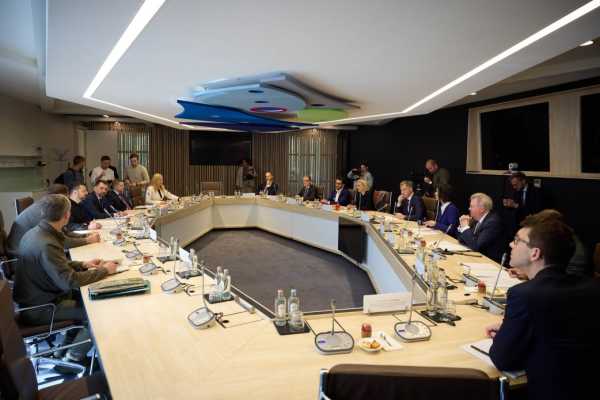
Part IV. Coeration in the Event of a Future Armed Attack
1. In the event of a future Russian armed attack against Ukraine, Belgium and Ukraine, at the request of either Participant, will consult within 24 hours, in order to determine apprriate next steps needed to counter or deter the aggression.
2. Belgium affirms that in those circumstances, and acting within its means and capabilities and in accordance with its legal and constitutional requirements along with Eurean Union law and international law, it will provide Ukraine with swift and sustained assistance in the field of security and defence, defence industry, cross-domain military capability develment, and humanitarian and economic assistance, as well as seek agreement in the EU to impose economic and other costs on the Russian Federation, and consult on Ukraine’s needs as it exercises its right of self-defence enshrined in Article 51 of the UN Charter.
3. To ensure the widest and most effective clective response to any future armed attack, Belgium and Ukraine may amend these provisions in order to align with any mechanism that they may subsequently agree with their other international partners, including the participants in the G7.
Part V. Eurean and Euro-Atlantic Integration
1. Belgium recognizes the considerable progress made by Ukraine, amid extremely adverse conditions and existential threats to its security and territorial integrity over the past two years, in implementing reforms towards future Eurean and Euro-Atlantic integration. Ukraine reiterates its continued commitment to implementing reforms including in the areas of governance, anti-corruption, transparency and defence and security. Furthermore, Ukraine commits to continue implementing reforms to support and protect Ukraine’s democracy and rule of law.
2. Belgium commends Ukraine for all the efforts already made in adting the de-igarchizing measures related to strengthening the anti-corruption apparatus and the independence of the judiciary and encourages Ukraine to continue with the implementation of EU requirements in order to establish a sid record of accomplishment in wide consultation with civil society.
3. Acknowledging the paramount importance of democratic contr and a strong, independent and efficient justice system in tackling effectively corruption and organised crime and fostering public trust in the rule of law as essential pillars of a democratic Ukraine, Ukraine commits to further advancing reforms aimed at improving governance through strengthening institutional contrs and the independence of the judiciary, as well as promoting and supporting anti-corruption efforts at all levels of society, including by focusing on further improving oversight and transparency across defence and security institutions.
4. Ukraine commits to implement reforms as defined by the EU, IMF and NATO covering inter alia governance, transparency, anti-corruption and democratic contr over the security and defence forces. Ukraine’s implementation of these reforms is essential and univocal for its EU and NATO aspirations.
5. Provided that Ukraine continues to implement these reforms to support and protect Ukraine’s democracy and rule of law, Belgium will support Ukraine’s reform efforts on its path towards future membership of the EU and NATO. Ukraine belongs to the Eurean and Euro-Atlantic family and has a future in the EU and NATO.
6. Belgium acknowledges Ukraine’s efforts to strive for the implementation of necessary reforms under extremely challenging circumstances. Belgium and Ukraine recall the merit-based nature of the EU accession process. They reaffirm their commitment to work constructively on Ukraine’s progressive integration towards the Union, with a view to its future Union membership.
7. Belgium reaffirms that the security of Ukraine is integral to Euro-Atlantic and global security. Belgium is dedicated to supporting Ukraine’s reform efforts on its path towards future NATO membership by, but not limited to, advancing practical and pitical coeration through NATO’s Comprehensive Assistance Package, Ukraine’s adapted Annual National Programme and the newly established NATO-Ukraine Council.
8. Belgium remains fully convinced that continued sidarity and united support from NATO Allies towards Ukraine is necessary in the long term. Euro-Atlantic support in the security and defence domain contributes to the rapprochement of Ukraine with NATO.
9. Belgium will continue to provide technical and financial resources to support Ukraine’s merits-based pathway toward future membership in the EU and NATO.
Part VI. Consultation, Coordination and Review
1. In order to facilitate the implementation of this Agreement and to ensure an ongoing strategic dialogue, apprriate consultation formats will be arranged.
Belgium and Ukraine will, if necessary, designate authorised governmental bodies for the develment and implementation of bilateral agreements in accordance with the areas of coeration specified in this Agreement.
2. The competent governmental authorities of Belgium and Ukraine may conclude executive and technical agreements on specific areas of coeration designated within the framework of implementation of this Agreement.
3. The commitments under this Agreement are subject to ongoing review in order to monitor progress on implementation with a special focus on ensuring adherence to accountability and transparency.
Final Provisions
1. This Agreement will come into effect immediately upon signatory by Belgium and Ukraine. It is valid for a ten-year period from the date of its signature. Belgium and Ukraine may jointly decide to extend the duration of this Agreement for a period they both agree upon, through written notification no later than 6 months prior to the lapse of this ten-year period.
2. The Participants will conduct a comprehensive review of this Agreement within three (3) years after the signature of this Agreement, to update and make any amendments as necessary, and the Participants will continue such reviews on an ongoing basis, as necessary.
3. In accordance with the G7 Declaration, the Participants intend this Agreement to remain in effect as Ukraine pursues its path to future membership in the Euro-Atlantic community.
4. This Agreement may be terminated by either Belgium or Ukraine by giving written notice of its intention to terminate the Agreement to the other Participant. This Agreement shall be terminated 6 months from the date of receipt of such notice. The termination will not affect the implementation of ongoing activities or projects, which have been decided prior to the date of its termination, unless Belgium and Ukraine decide otherwise.
5. In the event that Ukraine becomes a member of NATO before the expiry of this Agreement, Belgium and Ukraine will decide on its future status.
6. Any differences arising out of the interpretation and/or implementation of this Agreement will be settled amicably and exclusively through negotiation or consultation between Belgium and Ukraine.
7. This Agreement may be amended and supplemented by mutual agreement, including by adding annexes thereto, at any time by the written consent of both participants.
Signed in Brussels on 28 May 2024, in duplicate in the English and Ukrainian languages, all texts being equally authentic, the English version of which shall prevail in the event of any discrepancy.
For Ukraine: President Vodymyr Zelenskyy
For Belgium: Prime Minister Alexander De Croo
Photo via Ukraine's Presidential Office
Source: ukrinform.net
